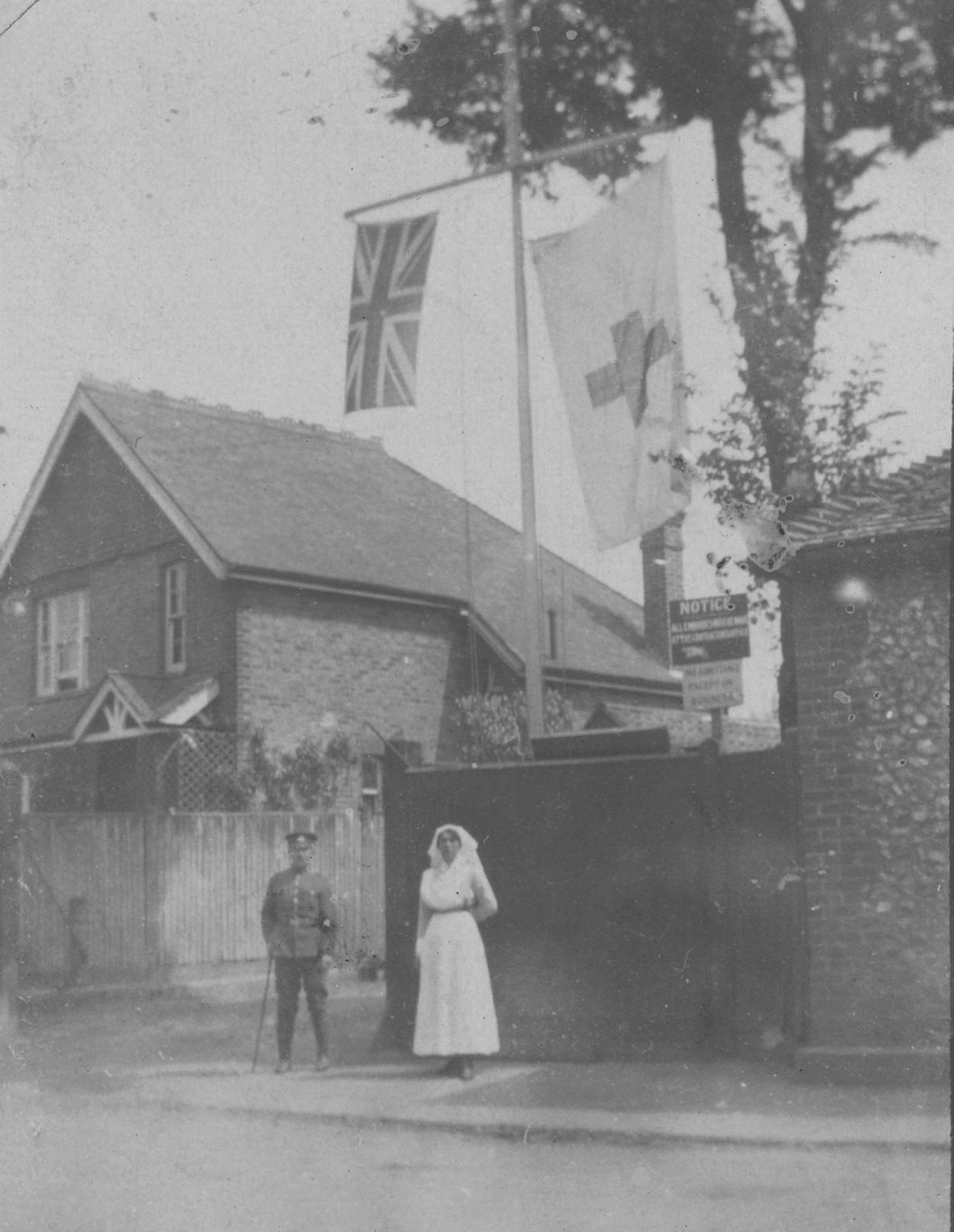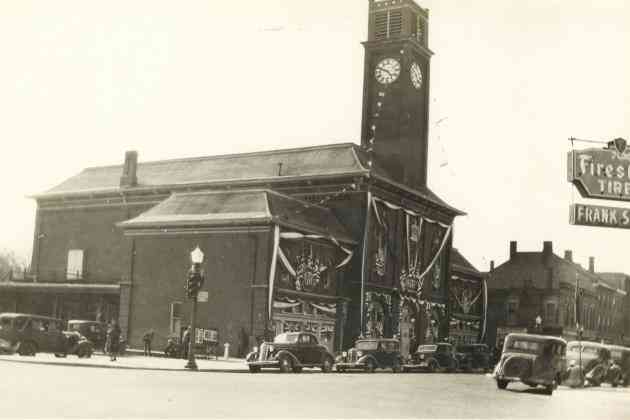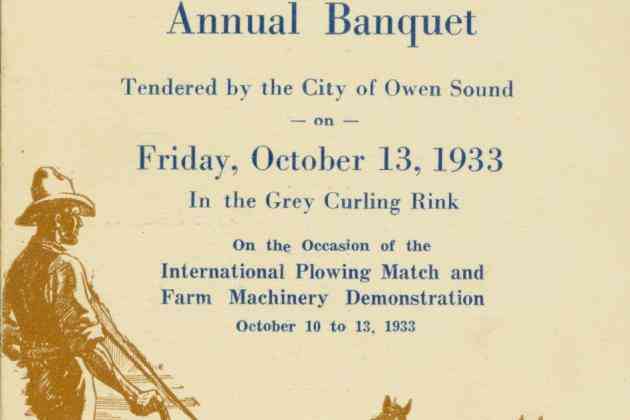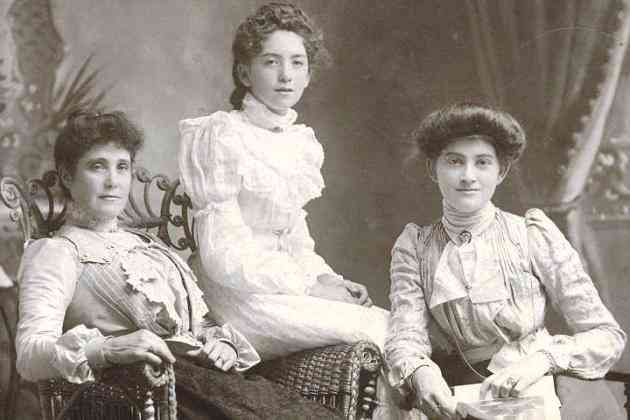Transatlantic voyage took place 99 years ago this month
The Grey County Archives holds among its treasures the letters of Luella Euphemia Denton which describe her experiences as a nurse during World War I. The letters cover the period from 1916 to 1919 and are written from her postings in England, France and Belgium. More information on Miss Denton, and the letters she wrote during this time may be found at: http://www.greyroots.com/exhibitions/virtual-exhibits/a-canadian-nursing-sister/
The letter which follows is in addition to the ones described above, and gives a detailed and most interesting account of her initial voyage across the ocean to join the fearsome Great War. As well, she provides a firsthand insight into the operation of an army hospital in England. It is clear from her writing that Miss Denton, while perhaps somewhat apprehensive about what is to come, is clearly excited and awed by the whole experience.
Wednesday, March 29, 1916
MISS L.E. DENTON TELLS OF HER TRIP
INTERESTING STORY OF HER VOYAGE ACROSS THE ATLANTIC
Amongst the very interesting war time letters few are as interesting as the following received from Miss L.E. Denton, nursing sister at the Ontario hospital at Orpington, England to her sister, Miss Jessie Denton.
We left Toronto on Wednesday, March 29th, after a morning and afternoon parade. In the afternoon Premier Hearst gave a splendid address telling us to do our “bit” and remember that we were representing Ontario and Canada. We hope not to disappoint the home people. At eight-thirty we went to the station where already a large crowd had gathered and the sisters were saying good-bye. It was quite a surprise as we thought we were to leave quietly. Capt McLean was in charge and we soon formed lines and marched, to the amid the cheers (sic) of the friends and soldiers who had come to bid us God-speed. The cheers from the soldier boys for the sisters echoed and re-echoed as they went up from several thousand throats. They did more than echo, they helped to choke a suspicion of a lump that many claim to have felt rising from somewhere. We congratulate ourselves on the brave way each sister said her last farewells. At ten-thirty “All Abroad” (sic) was hear and our last glimpse was of waving handkerchiefs and the faces of friends as they looked at the train and we moved on. We really were given a royal send-off.
Thursday we enjoyed ourselves very much. The service was fine, meals splendid, and the scenery was interesting. We arrived at Montreal at 10 a.m. and were allowed to walk on the platform. We had taken on a large number of coaches with soldiers of the 59th Battalion, during the night. Every station had quite a number of people ready to cheer us on our way, I haven’t said, but of course you will understand that besides eighty-one nurses there were about thirty doctors or captains, as they are now called. At 4 p.m. we stopped at a little village took the only store by storm. (sic) The poor Frenchman and his wife were almost carried away with the rush. Here we got quite a scare. While we were in the store our train moved down the track. It stopped, however, after going about a hundred yards, but we, by this time were running down the track after it. The country over which we travelled all day was very flat and flooded with water or ice. The last place I remember at night was Rivere de Lut. (sic) In the morning at breakfast we were at Causapscal. We reached Campbelltown at 10 p.m. on Friday. Here we had a forty minutes stop and everyone enjoyed the fresh air and the walk on the platform. The soldiers were allowed out also and they went wild. Captured sleighs and horses and everyone who could possibly get a hang on place did so even on the horses backs, and went racing up and down street. However at the sound of the bugle all rushed back to the train. The scenery all day has been perfectly wonderful, mountains, snow capped and blue in the distance and sometimes straight up beside the train, higher than we could see. Early in the day we travelled near the Matapedia River and later by the Baie des Chaleur and could see the Gaspe peninsula in the distance. The sunshine was glorious all day. We set our watches ahed (sic) one hour. We passed so many small villages and unless one happened to be on the side of the car on which the village was, you saw nothing as they were only on one side of the track. Everywhere women and children crowd the doors and windows and wave handkerchiefs.
At 7 p.m. we reached Moncton after having passed a beautiful part of the country, wonderful mountains, thickly dotted with trees and snow covered. The valleys and rivers were splendid. New Bruinswick (sic) must be proud of its scenery. At Moncton the people were expecting us and several thousand people were at the station to cheer us on our way. There were two bands and altogether it was quite a rousing reception. The bands played Keep the Home Fires Burning, Auld Lang Syne, God Save the King, and many other tunes. Our dining car was opposite the platform and we were having dinner. It happened that as we were having our soup the National Anthem was played and we all came to attention. Rather a difficult thing to do in the midst of soup. People crowded the car windows asking for souvenirs and giving us addresses. One man gave me his card, he was a Wholesale Hay Dealer.
Saturday at 9 a.m. we arrived at Halifax. Mud, mud and still more mud. There were a number of trains with soldiers of the 59th and 61st. We all marched to the ship and found that we were going on the Olympic, sister-ship to the Titantic (sic), a wonderful ship. This her first trip to Canada (sic) and it is considered the finest feat ever attempted to take 6000 soldiers and 100 nurses across the Atlantic. I consider it a great privilege to be allowed to travel in a troop ship. In time of peace to travel on the Olympic first class would be at least $500.00 for the passage. She is, I think, the fourth longest ship afloat, weighs about 48,000 tons, length 882 feet 9 inches, breadth 92 feet 6 inches, depth 104 feet, crew 900, 4 funnels, 36 furnaces to each funnel, burns 800 ton coal daily. The dining room we use seats over 400. The larger one is used for the soldier boys’ sleeping quarters. When the ship was taken over as a troop ship the large dining room, ball room, and some salons were relieved of their fine furnishings and is used entirely for the boys. There are eight decks, A, B, C, D, E, F, G and H. Four and a half times around the deck is one mile. The bakers have to work day and night to provide food for us all. 11000 eggs are used in one day, two men do nothing but cut bacon and I think there are about eight butchers. There are four battalions on board, 59th, 61st, 67th (Western Scots) the 61st from Winnipeg, 59th from Brockville and the 71st come, I think, from the east. Besides what they call Rag Tags, reinforcements for other battalions, such as the Infantry, Princess Pats, Mounted Rifles, Ontario Military Hospital Staff, Doctors and nurses, Imperial Army doctors and nurses and many others. All evening it was one awful commotion, soldiers to right of me, soldiers to left of me, etc. Our cabins are lovely, prettily furnished and comfortable. They are as large as an ordinary bedroom, three go in one cabin. The ship is painted outside a dark grey and no name can be seen. She looked so grim and dark as we saw her from the pier. The windows are outside, lights are painted black. It has a rather depressing effect. It is all so grim and serious looking. At 7.15 we enjoyed a good dinner. On Sunday we had church parade and went to St. Paul’s Episcopal, a church with a history. It was the first church built in Canada, 1749. General Wolfe worshipped there and Hardy was married there. We were given a nice greeting, wished Godspeed and were given a blessing. We were invited to stay for communion, which we did. The service was very impressive. Sunday afternoon the bands played and troops came abroad. (sic) Thousands of people were on the pier. We left the dock at 5.15 and anchored a short distance out. All morning the dock men and seamen were very busy loading provisions, barrels and barrels of sugar, flour, etc., and endless quantities of meat. It wasn’t very appetizing, but we ate our meals nevertheless.
On Monday a hospital was opened the first night for the sick boys. There are quite a number sick. I was on duty all day and had a very interesting time. A military ship hospital is very different from any other. A dance was given at night by the officers, and was much enjoyed. Really a military dance is beautiful. The officers in uniform and the sisters in their blue and scarlet make a pretty picture. Had anyone told us three years ago that we would all be at a military dance on board a troop ship we would scarcely have thought it possible. The deck was closed and the lights shone on fair ladies and brave men. Tuesday nothing unusual.
Wednesday on deck at 6.45. Raised anchor a 9.40 and with mingled feelings we said good-bye to Canada and wondered when we would see it again or even land. The order is “everyone wear life belts” and we have life saving drill everyday. The general alarm is a shot (sic) sharp blasts of the whistle, a most weird sound. We are supposed to be on A deck in our given places in about thirty seconds, we live on C deck. The lifeboats were lowered immediately to deck level ready for instant use. They remained there during all of the voyage. The seriousness of it all makes one think, it is really the first time I have realized just what it means to be a soldier and take a sea voyage in war time. Just to see 6500 people wearing life belts impresses one rather forcibly. At night the boat is kept in as complete darkness as possible, no ports open and doors all closed. It has been very gloomy and rainy all day. A very unfortunate thing happened as we were leaving the river. The light ships which came out for the pilots, crashed in ours, her spars taking several of our life boats with it. It shows that a small thing can cause a great deal of damage. Many nurses are sick. Gale blowing all day.
April 7th. Still foggy. They say we passed over the grave of the Titantic (sic) last night. The fog has cleared after thirty-six hours of hearing the fog horn. They also say that the captain never leaves the bridge. He surely has a very serious position. The boat is guarded with soldiers, in all, one thousand men are on guard. I am on night duty in hospital. Had a very busy night. The poor boys are very sick and many of them have pneumonia, tonsilities (sic) etc. I feared we would lose one, but he is better.
Saturday, a beautiful day. Life saving drill and gym work. We have a very nice gymasium (sic) and good instructor. I thought we were going to have the use of the swimming pool but the soldiers use it for baths. We are glad to give it up for them. A splendid concert was given by the officers, and some privates helped entertain.
Sunday, a beautiful morning. Service for all the troops, I was at part of a Presbyterian service for the 59th . Ours was Baptist, conducted by a private of the 61st as the chaplain was sick. There are a number of chaplains on board. Our minister spoke from “Ye are not your own, ye are bought with a price.” We enjoyed the service and sermon very much. Doctors, nurses, A.M.C. boys attended our service. Later we were addressed by Colonel Ross of the 67th on his experiences at the front. He is returning. His address was splendid. During the afternoon a ship was sighted and immediately our guns were uncovered (we are nearing the danger zone,) but the ship passed without further alarm. Many more armed guards have been added, who even have bayonets fixed. I have been anxious to see a whale, but nothing but a porpoise has come to view.
Monday a.m. our convoys have appeared and it is a great relief to have such good protectors. They look small but we know that they are powerful.
Wednesday p.m. the first sight of land and the Irish members of our family say they see the shamrock. It has been a day of suspense, but nothing has happened on Tuesday. We hear that the German subs were after us last night and that one of our little protectors was away three hours chasing one, and also that an Italian boat was sunk. We took a different course than was expected and this sub was waiting for us, but got the Italian boat instead. This news is supposed to have come by wireless.
- our convoys left us as the pilots came on at 7 a.m. We still wear our life belts although danger is practically over. Everyone is much relieved. Many slept with their clothes on, and many did not sleep at all. The first city we see is Brighton and Brighton tower. Ten o’clock we docked at Liverpool. Almost the first thing I noticed was “Chicago, Milwaukee, St. Paul tickets here.” It looked quite familiar. The most important thing here seems to be to keep the shades down and keep everything as dark as possible. A heavy fine is the penalty if you do not. There have been air raids in this vicinity lately and Orpington hospital has been warned. How would you like to go to bed, wondering if a bomb would drop in the night. We feel like looking upward every time we go out. At night we can see the searchlights from London searching for aeroplanes. I shall try to say a little about this hospital. I can’t begin to give you any idea of its beauty and completeness. There are sixty-four acres of land. It had been a wealthy gentlemen’s (sic) estate and everything has been kept in splendid order. Flower beds, shrubs, walks, pretty gateways and the large house makes a beautiful picture. There is even a greenhouse. We have chicken too. You know the famous Orpington hens. The buildings are on the hut system, long, low stone buildings, built so as not to attract attention. They are painted outside a grey color, and inside some parts are tan and others pale green. The color scheme seems to be given green and tan. The woodwork is plain wood stained. Walls are all panelled with this plain wood. We have a lovely large dining room, recreation room, writing room, library, reception room, walls are pale green, ceiling and upper part of walls are tan, hanging and floor covers dark green. There is an abundance of large comfortable chairs upholstered in large green (sic), writing tables, player piano and we hear that a Victrola is coming. Words fail in speaking of the hospital, everything is perfect, nothing missing. There are 1040 beds, 20 beds in each 20 wards, semi-private rooms, a wonderful operating room, three splendid tables in it. Latest kind of lights, ear, nose and throat department, eye, psychopathic, all are complete. Bathrooms galore, shower baths, general utility rooms. Diet kitchens and washrooms for each ward. In the diet kitchens we will fix all dishes for the patients, and wash all glasses, etc. in the wash room. It is truly the last word in a hospital. The kitchen is a wonder. In some way they cook vegetables in eight minutes. It is done by steam, I think. The wagons which carry the food to the wards, keep it hot at the same time. The supply rooms have quantities of everything, including blankets, pillows, bathrobes, caps, hospital clothes, brushes, combs, hot water bags, etc., etc. In all you can think of nothing that is not there. There is even a night dining room for the midnight suppers of the night nurses. There is an admittance room, where the ambulance can back up to the door, and inside the first information, such as your name etc. is taken, then the necessary treatment is given. The patient is passed to the orderly, bathed, given fresh clean clothes, and put to bed. There is a splendid large recreation room and theatre. In one end are tables and chairs for the “up” patients to enjoy themselves, in the other end is the stage, complete with scenery, dressing rooms, footlights, etc. We expect some good times here. I think you must come to visit me to get any idea of it all. In all we have had a splendid time so far. Weather fine, service on board train and ship. all that could be expected. Here it has rained almost every day since we arrived. Sunshine one minute and rain the next. Orpington is a beautiful quaint little place. One women (sic) said that they never had such a big thing as this in Orpington before, and that we all looked so “appy” even if the Canadian boys are “urt”. The boys look happy anyway. You see I am trying to economize on paper. Now write. Won’t You?








